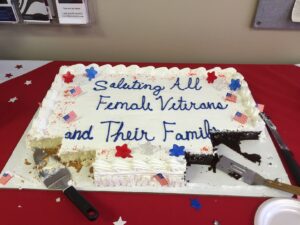Women veterans continue making strides for service recognition

By Kathryn Menue
Editor
BELVIDERE – “From the Continental Army Soldier Deborah Samson to the first female Army Rangers, Capt. Kristen Griest and First Lt. Shaye Haver, American women have been serving in the U.S. Military for hundreds of years,” militarywoman.org reported.
“Women have been a part of war effort since the Revolutionary War, but in the early days of our nation they had to cloak themselves in disguise to serve alongside men. When they were accepted into the military, women were given auxiliary roles. As the weapons and methods of warfare changed in the late 20th century; however, the Pentagon began to realize that gender matters less on the battlefield.”
Since the beginning of America, millions of women have served in the military and more women are joining the service.
According to the Department of Veteran Affairs, there are 2,035,213 women veterans across the United States, Puerto Rico, and the U.S. Territories/Foreign. Of that total, 55,069 women veterans come from Illinois.
“As of 2015, women make up about 15 percent of the U.S. military,” militarywoman.org reported. “More than 165,000 women are enlisted and active in the armed services with over 35,000 additional women serving as officers.”
Due to the high number of veteran and enlisted women, local veterans decided that these women should be recognized for their service.
On Friday, March 25, the Boone County Veterans Assistance Commission (BCVAC) held a celebration for female veterans at the BCVAC office in Belvidere to honor the female veterans for their dedication to this country.
Kathy Reed, an Army veteran, coordinated the event, which opened the door to other women veterans dedicating their services to help other female veterans receive equal recognition for their services.
Not only have male veterans had a tough run through history, but female veterans as well.
Mary Nicholls, an Army veteran who served in the Vietnam War from April 1968 to December 1969, attended the female veterans’ celebration and said that after her service in the military, she returned to Rockford and found it hard to find a job.
“Everything would go swimmingly until they found out I was a veteran,” Nicholls said. “Then, I wouldn’t get the job.”
However, Nicholls did receive a lucky break when the employment agency said the FBI was hiring in Washington D.C. The FBI hired Nicholls, but the job didn’t last long before Nicholls decided to move on to work at the Pentagon for the next 20 years.
Nicholls received a lucky break and is proud to call herself a veteran, which she “advertised” wearing a female veterans’ sweatshirt and a Vietnam veteran cap. Nicholls also participates in parades, welcome home parties at the airport, and Midway Village war history exhibits.
However, not every woman is as proud to display their veteran status, nor are people always as accepting of female veterans.
Nancy Clark, an Army veteran who served from 1970 to 1990, is proud to be a veteran, but has found people who aren’t as keen to the idea as her.
Clark said that she has stood in uniform at veteran events and had people walk by her and thank all the men for their service, but not her. She’s had some even think she merely is wearing a costume, or that when she served she must have been a nurse, which is not the case.
Clark served three tours in Germany, served two years in Korea, served as one of the first female army recruiters, served in Reserve Component duty for four years, taught ROTC at the University of Southern Maine Gorham, Maine, and trained the National Guard and Army Reserves.
Yet, Clark said she has had a man say to her, ‘You should never have been in the service. You should have been home taking care of your husband.’
“That hurts me inside,” Clark said. “I hear so much and see so much that they’re [female veterans] are not being recognized.”
So, Clark decided to create an organization for female veterans, SHEVETS: Sharing Heroic Endeavors, Values, Ethics Together in Sisterhood.
Clark said this organization gives female veterans the opportunity to take pride in their veteran status and to lean on other women veterans for support, like she has done with her SHEVETS partner Melody Vrocato.
Clark lost her husband, also a veteran, in May 2015 after 43 years of marriage. Vrocato, a Marine veteran, lost her veteran husband of 46 years in July 2015.
“We’re leaning on each other in our healing process,” Clark said.
SHEVETS will give other female veterans the opportunity to “lean on each other” and learn about opportunities veterans can receive through the Veterans Assistance (VA) offices around the area.
Vrocato said that she has always gone to the VA for anything she needs, but that a lot of women won’t because they think it is mostly for men.
Vrocato wants to see that change and thinks SHEVETS is the perfect opportunity to show female veterans they can get the assistance they need.
“There is a need for it [SHEVETS],” Vrocato said.
The first SHEVETS meeting will be held on Thursday, April 28 at 6 p.m. at the Winnebago VAC.



